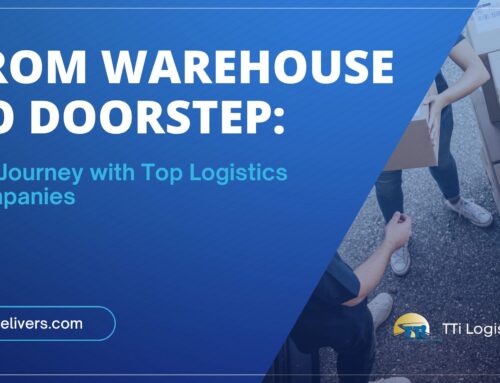In the realm of technology and innovation, few advancements hold as much promise and potential as artificial intelligence (AI). From revolutionizing industries to reshaping our daily lives, AI has emerged as a transformative force with profound implications for the future. In this blog, we’ll explore the fascinating world of artificial intelligence, its applications, challenges, and the role of TTi Logistics in harnessing its power for the benefit of our clients and the logistics industry as a whole.
Introducing TTi Logistics: A Legacy of Innovation
Before we delve into the intricacies of artificial intelligence, let’s take a moment to introduce ourselves. We are TTi Logistics, a leading logistics company known for our unwavering commitment to excellence, reliability, and customer satisfaction. With three decades of experience in the transportation, trade shows, high-value products, and warehousing sectors, we have established ourselves as pioneers in the field of logistics.
At TTi Logistics, we understand the importance of embracing emerging technologies to stay ahead of the curve and provide our clients with the best possible service. That’s why we have invested heavily in cutting-edge technologies, including artificial intelligence, to enhance efficiency, streamline operations, and deliver superior logistics solutions.
Demystifying Artificial Intelligence: A Primer
Artificial intelligence refers to the simulation of human intelligence in machines, enabling them to perform tasks that typically require human intelligence, such as learning, problem-solving, and decision-making. Unlike traditional computer programs, which follow predefined instructions, AI systems can analyze vast amounts of data, recognize patterns, and adapt to changing circumstances.
There are several branches of artificial intelligence, including machine learning, natural language processing, computer vision, and robotics, each with its own set of applications and techniques. Machine learning, in particular, has gained widespread attention in recent years for its ability to enable computers to learn from data and improve performance over time without explicit programming.
Applications of Artificial Intelligence in Logistics
In the logistics industry, artificial intelligence is revolutionizing operations across the entire supply chain, from transportation and warehousing to inventory management and customer service. Here are some key applications of AI in logistics:
Route Optimization:
AI-powered algorithms can analyze historical data, traffic patterns, weather conditions, and other factors to optimize delivery routes, minimize fuel consumption, and reduce transit times.
Predictive Maintenance:
By monitoring equipment performance and analyzing sensor data in real-time, AI systems can predict potential equipment failures before they occur, enabling proactive maintenance and minimizing downtime.
Demand Forecasting:
AI algorithms can analyze historical sales data, market trends, and other variables to forecast demand accurately, helping companies optimize inventory levels, reduce stockouts, and improve customer satisfaction.
Warehouse Automation:
AI-powered robots and drones can automate repetitive tasks such as picking, packing, and inventory management, increasing efficiency, and reducing labor costs.
Customer Service:
AI-powered chatbots and virtual assistants can handle customer inquiries, track shipments, and provide real-time updates, enhancing the customer experience and reducing the burden on human agents.
Challenges and Considerations
While the potential benefits of artificial intelligence in logistics are undeniable, there are also challenges and considerations that must be addressed. These include:
Data Quality and Privacy:
AI systems rely on vast amounts of data to make informed decisions. Ensuring the quality, accuracy, and security of this data is essential to the success of AI initiatives.
Ethical and Regulatory Concerns:
As AI becomes more pervasive in society, there are growing concerns about ethical issues such as bias, transparency, and accountability. It’s essential to develop ethical frameworks and regulatory guidelines to govern the use of AI responsibly.
Skills Gap:
Implementing AI technologies requires specialized skills and expertise. Companies must invest in training and upskilling their workforce to harness the full potential of artificial intelligence.
Integration and Compatibility:
Integrating AI systems with existing infrastructure and software can be challenging, requiring careful planning and coordination to ensure seamless compatibility and interoperability.
TTi Logistics: Pioneering the Future of Logistics with AI
At TTi Logistics, we are at the forefront of leveraging artificial intelligence to drive innovation and efficiency in logistics. By harnessing the power of AI-powered algorithms, predictive analytics, and automation technologies, we are transforming the way we manage transportation, warehousing, and supply chain operations.
For example, our AI-driven route optimization algorithms enable us to plan and execute deliveries more efficiently, reducing fuel consumption, carbon emissions, and transportation costs. Additionally, our predictive maintenance systems help us identify and address potential equipment issues before they impact our operations, minimizing downtime and ensuring reliable service for our clients.
Furthermore, we are exploring new applications of AI in areas such as demand forecasting, inventory optimization, and customer service, to further enhance our capabilities and deliver value to our clients.
Looking Ahead: The Future of AI in Logistics
As artificial intelligence continues to evolve and mature, its impact on the logistics industry will only grow stronger. From autonomous vehicles and drones to predictive analytics and robotic automation, AI technologies have the potential to revolutionize every aspect of the supply chain, making it more efficient, agile, and responsive to customer needs.
At TTi Logistics, we are committed to staying at the forefront of this technological revolution, continually innovating and exploring new ways to harness the power of AI for the benefit of our clients and the logistics industry as a whole.
Navigating the Future: TTi Logistics’ Journey with Artificial Intelligence
In conclusion, artificial intelligence represents a transformative force that is reshaping the future of logistics. From optimizing transportation routes and automating warehouse operations to enhancing customer service and demand forecasting, AI has the potential to revolutionize every aspect of the supply chain. At TTi Logistics, we are proud to be at the forefront of this technological revolution, leveraging the power of AI to drive innovation, efficiency, and superior service for our clients. As we continue to explore new applications and opportunities for artificial intelligence in logistics, we are excited about the possibilities that lie ahead and the positive impact it will have on our industry and the world.







